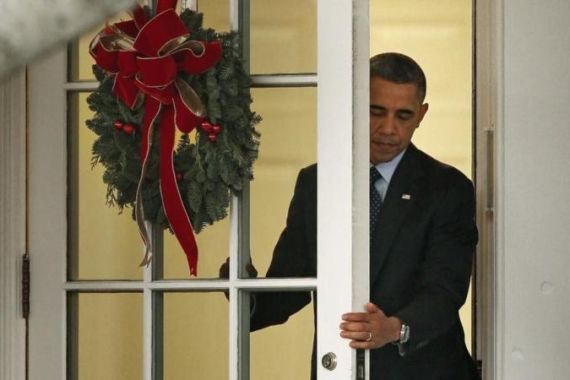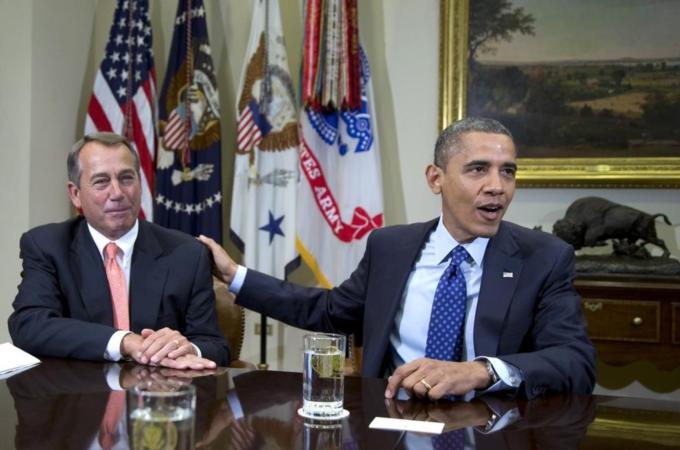Fresh doubt over US ‘fiscal cliff’ deal
As congressional leaders leave for recess without an agreement, White House says President Obama remains “hopeful”.

Hopes for avoiding the “fiscal cliff” that threatens the US economy have fallen, after fighting among congressional Republicans cast doubt on whether any deal could be reached with President Barack Obama.
Obama on Friday urged lawmakers to reach agreement on averting tax hikes on the middle class, saying he was ready and willing to do what it takes to get a deal by January 1.
Keep reading
list of 4 itemsEcuador weighs security, international arbitration in latest referendum
‘Triple spending’: Zimbabweans bear cost of changing to new ZiG currency
Boeing hit with 32 whistleblower claims, as dead worker’s case reviewed
The US president said he had spoken with Republican House Speaker John Boehner and met with Senate Democratic leader Harry Reid about the fiscal cliff. The president said he was an optimist and believed a deal could be hammered out.
Obama had been expected to leave as early as Friday to spend the Christmas holidays in Hawaii, but he gave no indications of his travel plans except to tell reporters “see you next week.”
Boehner, the top Republican in the House of Representatives, was forced to cancel a vote for his own plan on Thursday after it became clear that he did not have enough support from members of his party.
He had proposed letting taxes rise on households making $1m or more a year, but some Republicans, especially conservatives and members of the small-government tea party movement, do not want higher taxes at all.
A budget pact would need to win approval before automatic tax increases and deep spending cuts kick in on January 1.
‘God only knows’
Boehner on Friday signalled that he was still open to talks with Obama, but he also tried to shift the pressure for a deal to the president.
|
“They went from Plan B to plan see-you-later“ – David Axelrod, |
“We only run the House. The Democrats continue to run Washington,” he told reporters. Boehner said he did not know how the fiscal cliff would be avoided. “How we get there, God only knows.”
His plan, introduced abruptly this week, had been unlikely to pass the Democratic-controlled Senate, and Obama had threatened to veto it. But he had hoped it would rally Republican troops and strengthen his position in talks with Obama on how to make up for the country’s chronic deficit spending.
Instead, the withdrawal of his plan was an embarrassment and a major personal defeat. It also added uncertainty to prospects for any bill clearing the House.
Any compromise reached with Obama would almost certainly include terms even less appealing to Republicans than the plan Boehner had put forward.
“We had a number of our members who didn’t want to be perceived as raising taxes,” Boehner said on Friday.
Boehner may now have to rely on the support of the House’s Democratic minority if any plan is to get through the chamber. That could damage his standing within his party and affect his prospects for retaining the speaker’s position when the newly elected Congress takes office in January.
‘We are hopeful’
The White House said Obama will press ahead with Congress on a plan to avoid the fiscal cliff, but Thursday’s events leave little time for a deal.
“They went from Plan B to plan see-you-later,” Obama adviser David Axelrod said on MSNBC on Friday morning.
The House will not meet again until after Christmas, if then, and the Senate is expected to meet briefly on Friday, then not reconvene until next Thursday.
 |
| US President Barack Obama, right, wants to raise taxes by about $20bn a year more than John Boehner [AP] |
Pointedly, the statement did not say whether Obama would work with Boehner to revive the stalled talks or turn first to the Democratic-controlled Senate to try to salvage the situation.
The question of raising taxes on the wealthiest Americans has been the biggest sticking point in talks, as tax cuts approved during President George W Bush’s presidency are set to expire at the end of the year.
Obama campaigned for re-election calling for the cuts to be extended for anyone earning less than $250,000. Republicans opposed taxes going up for anyone.
Boehner and Obama had seemed to be making progress in negotiations, as Boehner’s plan proposed allowing taxes go up for those making $1m or more. Obama had offered a compromise $400,000 level.
In the negotiations, Obama and Boehner are separated by relatively miniscule dollar differences, by Washington standards. Obama wants to raise taxes by about $20bn a year more than Boehner.
Compared to the $2.6tn the government expects to collect next year and to the $3.6tn it plans to give out, $20bn barely registers – less than one percent of what the government already is on track to raise and spend.